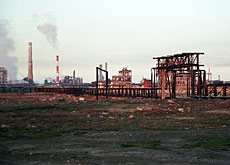Blacklist names worst pollution hotspots

Environmental group Green Cross Switzerland has issued a blacklist of the ten most polluted places on the planet, with Russia, China and India the worst offenders.
Campaigners say more than 12 million people are affected by pollution from the sites “where children are being poisoned in droves”.
“It is an indisputable fact that children in these places burdened with heavy pollution get sick and die. But solving these problems doesn’t even require enormous scientific efforts,” said Stephan Robinson, director of the International Disarmament Programme of Green Cross Switzerland.
In alphabetical order by country, the top ten are: Sumgayit, Azerbaijan; Linfen, China; Tianying, China; Sukinda, India; Vapi, India; La Oroya, Peru; Dzerzhinsk, Russia; Norilsk, Russia; Chernobyl, Ukraine; and Kabwe, Zambia.
Four of them – Sumgayit, Tianying, Sukinda and Vapi – are newcomers to the World’s Worst Polluted Places list, which was compiled for the first time last year by the Blacksmith Institute, an independent environmental organisation in the United States. The institute and Green Cross Switzerland have been partners since 2006.
Lead pollution
According to the Zurich-based organisation, the huge lead production facility in Tianying accounts for half of the overall pollution in the entire country.
As for Vapi, “more than 50 factories contaminate the local soil and groundwater with pesticides, PCB, chrome, mercury, lead and cadmium”.
The environmental group says the mercury level in the groundwater around Vapi is 96 times above the limits recommended by the Geneva-based World Health Organization.
Sumgayit in Azerbaijan is a former industrial complex from the Soviet era, which is said to contaminate the surrounding area with industrial chemicals and heavy metals. According to the report, Sumgayit’s cancer rate is 22 to 51 per cent higher than the national average and genetic changes in newborns are widespread.
“The purpose of the report is to bring attention to these specific issues because there are an awful lot of people whose lives are cut short by these types of pollution,” said Richard Fuller, founder and chairman of the Blacksmith Institute.
Not “rocket science”
Fuller said it did not require “rocket science” to fix the sites, simply a certain amount of investment.
He added that both the Blacksmith Institute and Green Cross Switzerland had established good working relations with some of the countries concerned and that governments were “keen for any advice and help they can get”.
A new feature of the report is the so-called “Dirty 30”, a larger group of polluted sites around the world that also includes the top ten.
The four sites replaced in this year’s top ten – Haina, Dominican Republic; Ranipet, India; Mailuu-Suu, Kyrgyzstan; and Rudnaya Pristan, Russia – can be found in the more comprehensive list.
The majority of sites listed in the Dirty 30 are located in Asia, with China, India and Russia leading the way.
According to the report, toxic pollution in these places comes from a variety of sources such as vast industrial areas, large mining and smelting facilities as well as from the production of chemical weapons during the Cold War.
swissinfo, Adam Beaumont
The top-ten list is based on criteria compiled by an international group of experts, including scientists from Johns Hopkins and Harvard universities in the US, and the Indian Institute of Technology in Delhi.
The panel also includes representatives of international environmental companies as well as the Blacksmith Institute’s own technical advisory board. Specialists from Green Cross Switzerland contributed to this year’s assessment.
The Blacksmith Institute and Green Cross Switzerland have been partners since 2006. The two organisations are working jointly on a project to eliminate pollution from former mining and smelting operations in Rudnaya Pristan in Russia’s Far East.
Green Cross Switzerland, which was founded in 1994, focuses on dealing with the damage caused by industrial and military disasters, as well as cleaning up contaminated sites from the Cold War period.
Key issues include improving the quality of life for people affected by chemical, radioactive and other types of contamination, plus the promotion of sustainable development. The Zurich-based organisation says it has a turnover of several million francs.
Green Cross International, which is based in Geneva, was founded in 1993 by former Soviet leader Mikhail Gorbachev.

In compliance with the JTI standards
More: SWI swissinfo.ch certified by the Journalism Trust Initiative









You can find an overview of ongoing debates with our journalists here . Please join us!
If you want to start a conversation about a topic raised in this article or want to report factual errors, email us at english@swissinfo.ch.